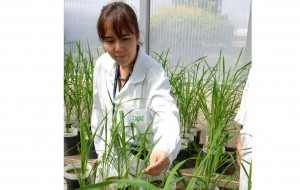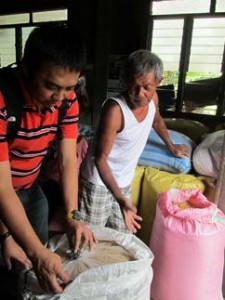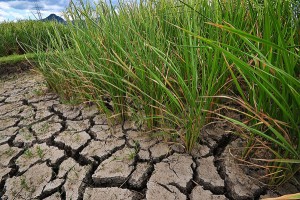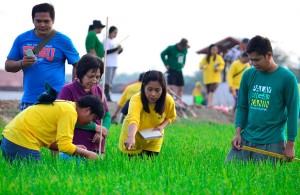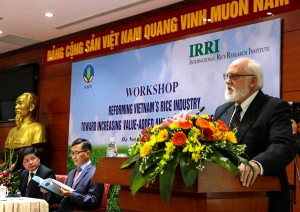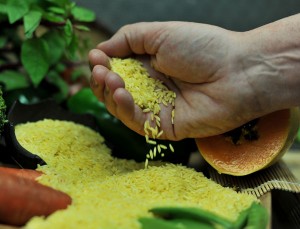
“I came here as president, and as a farmer.”
With these words, His Excellency U Thein Sein, president of the Republic of Union of Myanmar, underscored his desire to continue his country’s decades-long collaboration with the International Rice Research Institute (IRRI).
This president is, in fact, also a farmer. Every day, early in the morning, he quickly inspects his crops before turning to the affairs of state.
The President, who visited IRRI’s headquarters in Los Baños, Laguna, on 5 December 2013, called on the IRRI community to continue working with his government to improve the lives of Myanmar’s rice farmers by improving rice productivity in the country.
 The President appraised those present on the challenges and aspirations of Myanmar’s agriculture sector. “We need high-yielding varieties to address rising population and decreasing land area planted to rice,” he said. Myanmar has a population of 60 million, which is projected to reach 100 million by 2050.
The President appraised those present on the challenges and aspirations of Myanmar’s agriculture sector. “We need high-yielding varieties to address rising population and decreasing land area planted to rice,” he said. Myanmar has a population of 60 million, which is projected to reach 100 million by 2050.
President Sein asked IRRI to develop and share improved rice varieties that respond to unfavorable environments of the hilly and dry regions in the country’s north, and the wet and frequently flooded areas in the south. “Ours is a country with a varying topography and agroecological zones. We need rice varieties that respond to challenges from these environments.”
“Our traditional varieties could not survive submergence, so the introduction of IRRI’s flood-tolerant Swarna Sub1 for testing holds big promise for our farmers in the south,” he added.
The President also asked IRRI to help the Myanmar rice farmers develop crop management technologies that help achieve better yield. He expressed Myanmar’s hopes to become a global player in the rice market. “We are self-sufficient in rice, so we export our surplus to help our neighboring countries with food security.”
The Myanmar President is on a state visit to the Philippines and were accompanied to IRRI by Philippine Agriculture Secretary Proceso Alcala.
Minister for Agriculture and Irrigation U Myint Hlaing expressed his gratitude to IRRI’s agronomists and scientists. “We are willing to cooperate with IRRI to help increase our farmers’ daily income.”
The backdrop for the visit is the Myanmar Rice Sector Development Strategy, which IRRI is helping develop. IRRI is already greatly involved in the implementation of current projects to assist the rice sector in Myanmar.
Started in 1965, collaboration between Myanmar and IRRI has, to date, resulted in 69 improved rice varieties released in the country and more than 400 rice scientists and experts trained at IRRI. Other initiatives have included the development of new rice varieties, improvement of rice farm management, deployment of small-scale farm machinery, and strengthening of rice expertise. More recently, in 2012, IRRI expanded its activities by introducing stress-tolerant high-yielding varieties and worked with farmers to develop best management practices in the delta and the central dry zone.
IRRI’s office in Myanmar is led by Liaison Scientist Madonna Casimero. The President, who led about 20 delegates to the Institute, also visited the International Rice Genebank, where more than 3,000 rice types from Myanmar are conserved among a collection of more than 118,000.
With President U Thein Sein were members of his cabinet: U Wunna Maung Lwin, minister of foreign affairs; U Soe Maung, minister for the president’s office no. 2; U Myint Hlaing, minister for agriculture and irrigation; U Zayar Aung, minister for energy; U Myat Myat Ohnn Khin, minister for social welfare and resettlement; Hla Htay Win, chief of the general staff (army, navy, and air force), Ministry of Defense General; U Ye Htut, deputy minister for information; Win Myint, deputy minister for the president’s office no. 1; Than Aung, deputy minister for health; and U Ye Myint Aung, ambassador of Myanmar to the Philippines.

